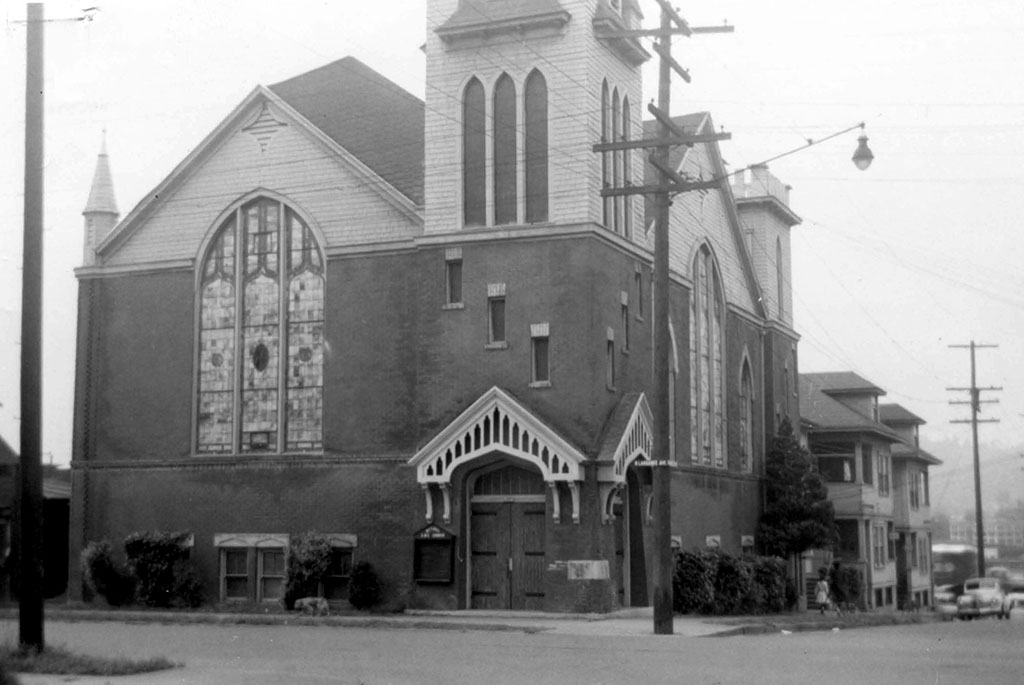Darrell Grant’s Come Sunday is a walk through Portland’s inner-northeast neighborhoods, which were once home to over 200 Black churches. It was commissioned by Third Angle New Music, which has a focus on creating a “soundtrack for our time”.
The soundwalk is one of the shortlisted pieces in the Sound Walk September Awards 2021. Here, Mario Bastea-Forte, of Third Angle New Music, takes a look at what lead to the creation of Darrell’s work.
In 2016, Third Angle New Music approached local jazz musician, composer and educator Darrell Grant with the idea of commissioning an opera about gentrification in Portland, Oregon. Portland is often considered one of the “whitest” cities in the US, whose racist laws and redlining practices have long been intertwined with its past. This forced displacement of Black communities is a story that may be unfamiliar to newer, whiter residents, but one that many Black residents know too well. And yet, this history lives through the communities that experienced it, as Grant would hear time and time again from the Portland natives he met after moving to the city in 1997.
The scope of the story seemed to lend itself to a large-scale medium, or platform, like opera, although Grant had never written an opera before. He initially laughed at the idea. Why would he agree to write in a medium that he knew so little about, and one that felt so foreign to Black artists and communities? But after more thought, he ended up coming around to the idea, and eventually began researching and composing what would end up becoming Sanctuaries.
Had it not been for the pandemic, this story would only be about an opera. Sanctuaries was set to premiere in April 2020, but as you can imagine, it became clear in advance that this premiere would no longer be safe or feasible. After 4 years of hard work and preparation, Grant would have to wait a little longer to see his opera realized on stage. But after re-evaluating and contemplating what programming possibilities remained in this new, shut-down, world, Third Angle approached him once more and asked him to write a soundwalk.
Third Angle is an organization that aims to create a soundtrack for the present day, and one of the best things they could create for musicians and their audiences at this time was a way to experience art safely, outside of their houses. Grant’s Soundwalk, titled Come Sunday, was the 6th installment in a series of 10 Soundwalks commissioned by Third Angle, all made by local composers and sound artists during the pandemic.
Released in April 2021, about a year after Sanctuaries would have premiered, this Soundwalk tells the story of the Albina district through voices of its current and former residents. It accompanies listeners as they follow a path that leads them by 15 houses of worship, still standing in an area that was once home to over 200 Black churches and 80% of the city’s Black population. Combining oral history, African-American spirituals, poetry, historical texts, jazz piano, new music, and the sounds of the neighborhood, Come Sunday feels like a living, breathing story. A story that paints an aural portrait of a community with a common institution at its heart — leading the fight for justice, serving the vulnerable, holding the community in good times and bad — the Black church.
Since the release of this Soundwalk, Grant’s opera Sanctuaries was finally premiered in September of 2021 for three sold-out performances. These shows took place outdoors at the Veterans Memorial Coliseum Pavilion, a site that is itself a physical monument to the gentrification and forced displacement in Black communities.
Some of the conversations Grant recorded when researching and creating Come Sunday were played while audience members gradually arrived at the Pavilion for Sanctuaries, and the words of these Portland residents set the appropriately somber tone for the shows.
While this Soundwalk is created to be site-specific, it also makes for a wonderful listening experience at home. The conversations are in a way specific to neighborhoods in Portland, yet they speak to issues that disenfranchised communities face around the US and the rest of the world. It is hard to think of the pandemic as having resulted in many good things, but it is true that this Soundwalk would not exist without Sanctuaries being unwillingly postponed.
For more information on the texts, voices and music, you can visit Third Angle’s website.
Mario’s look-back is the eleventh in a series of the creators shortlisted for the Sound Walk September 2021 Awards talking about their work.
Mario Bastea-Forte is a classical cellist by training. He studied performance at the Eastman School of Music and University of Miami, and has since continued pursuing interests in music production, design, and coding. While in school, Mario created concert programs for the Eastman Concert Office, and he recently served as a design intern for the Concert Artists Guild in New York. He also volunteers as the Administrative Assistant for Sound Mind, an organization focused on combating the stigma surrounding mental illness in classical music.


